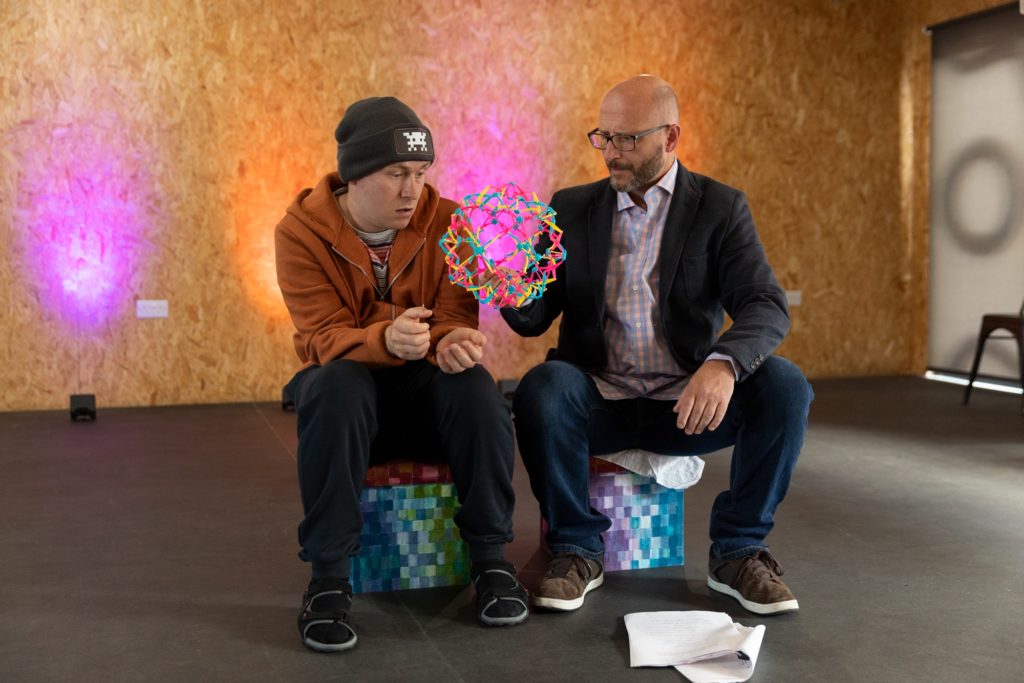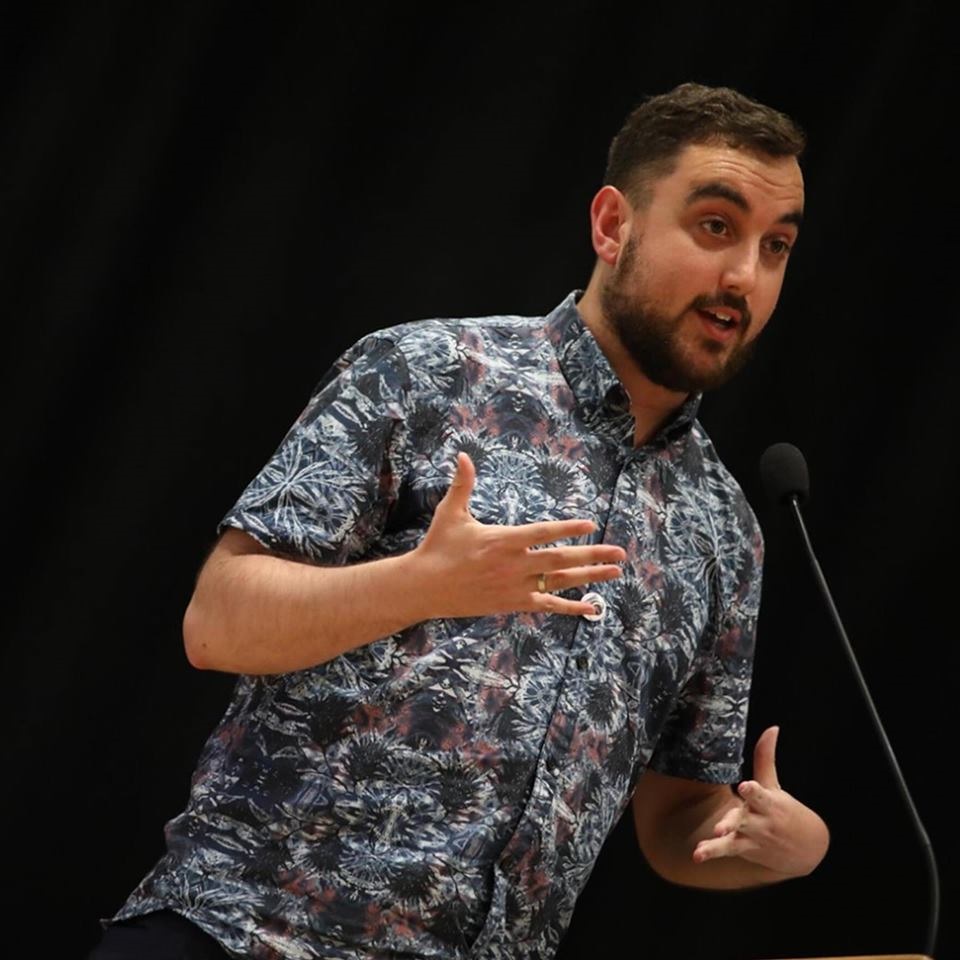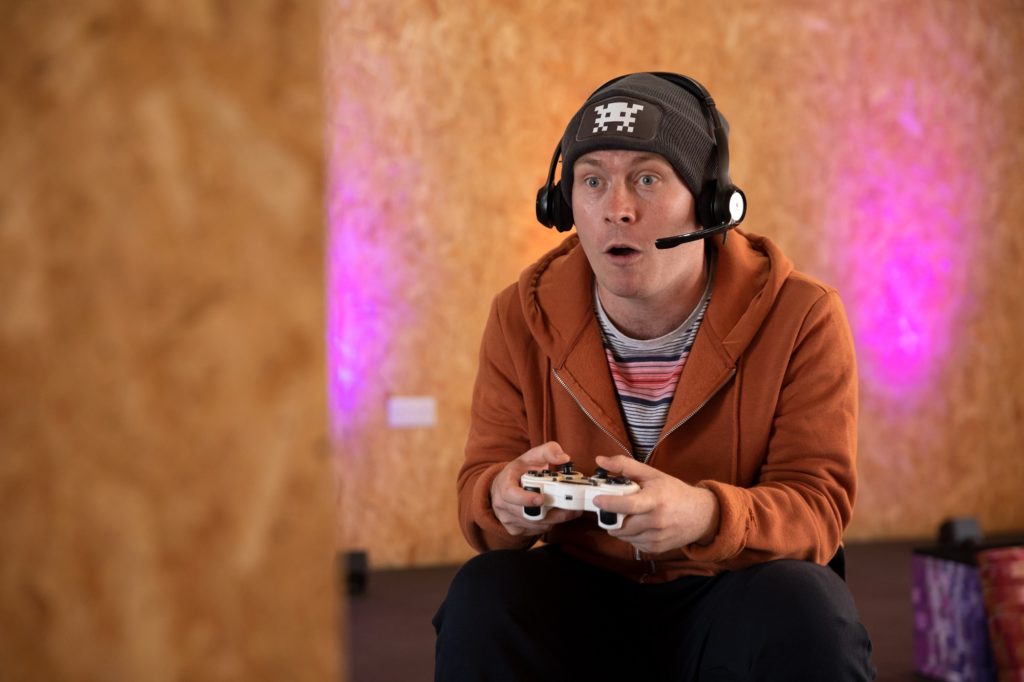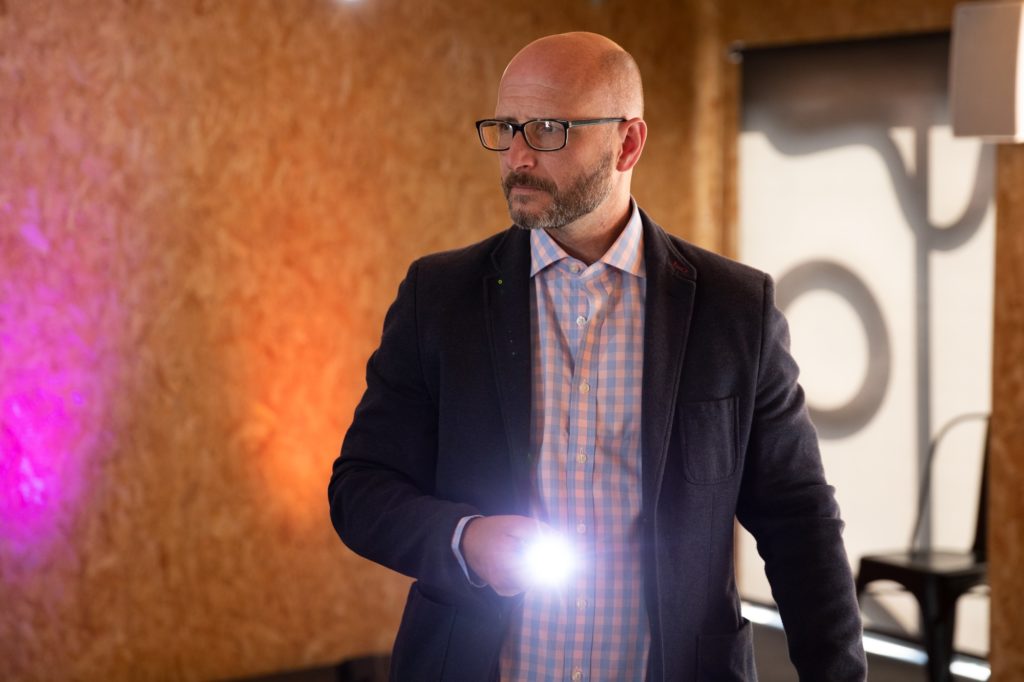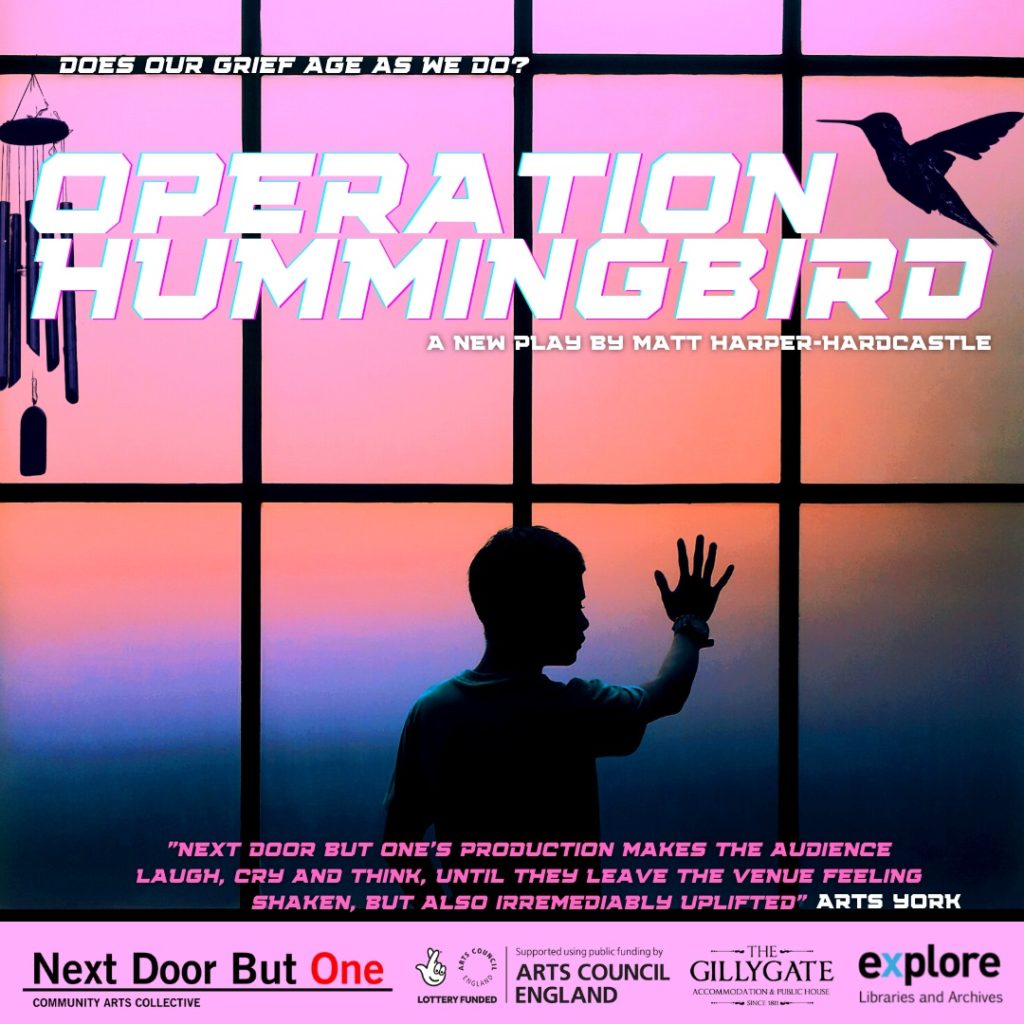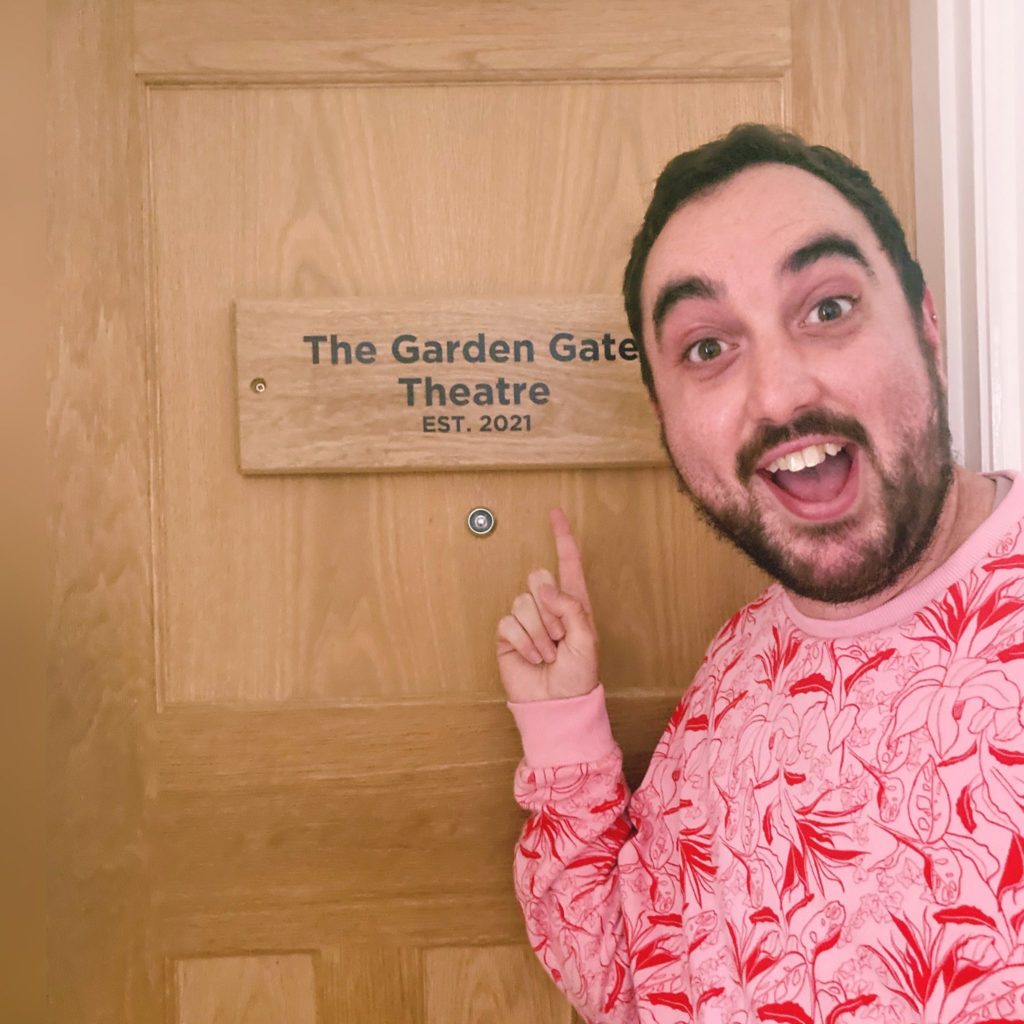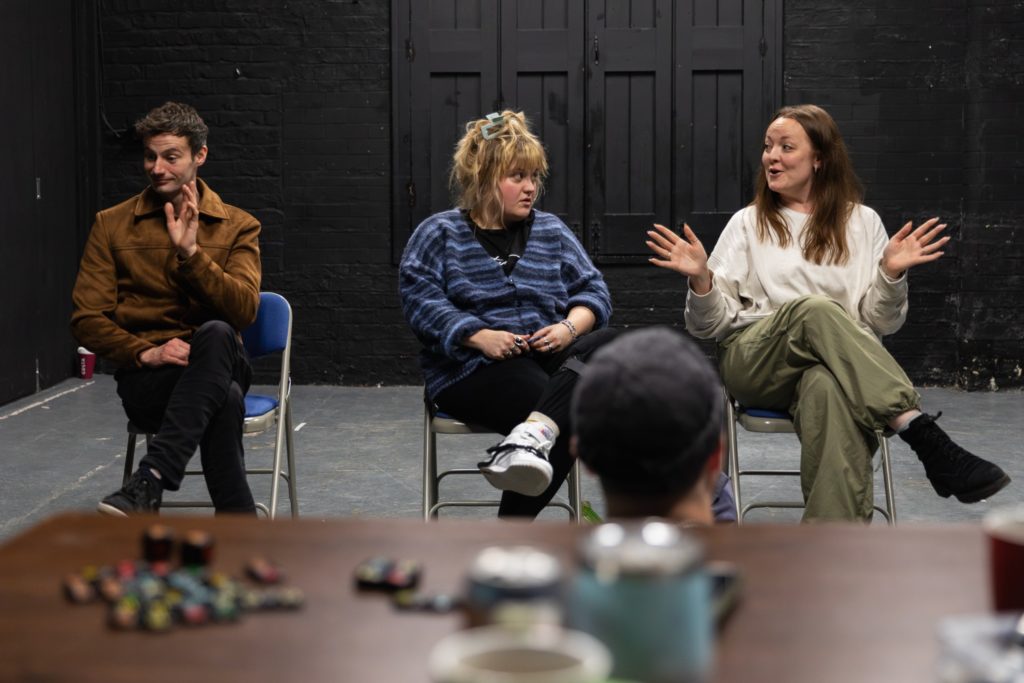
Ian Weichardt, Christie Peto, centre, and Evie Jones rehearse Hospital Doors under the watchful eye of writer-director Matt Harper-Hardcastle. Picture: James Drury
NEXT Door But One’s new production, Hospital Doors, shines light on the lived experience of disabled, LGBTQ+ and unpaid carer communities in York in next week’s premiere at Theatre@41, Monkgate, York.
On joining Arts Council England’s Investment Programme in 2023, the York community arts collective set an ambition of creating a new play that intertwined the real-life stories of three of their long-standing community collaborators.
Since then, chief executive officer and artistic director Matt Harper-Hardcastle has been running workshops with disabled, LGBTQ+ and unpaid carer groups to produce a script that explores the uniqueness and commonalities from across these identities.
After 18 months of development, Hospital Doors will meet an audience for the first time from March 12 to 15 in a limited series of public performances at Theatre@41.
“I cannot wait to share Hospital Doors,” says Matt. “It really feels like a flagship production for Next Door But One.
“It epitomises our whole ethos and approach to creating theatre; putting the community first, involving them from day one and staging exciting and compelling stories which amplify often overlooked or unheard voices.”
As well as Hospital Doors being an artistic ambition for Next Door But One, the show is a personal investment for Matt. “My own identity has an affinity to all three community groups, so to be able to bring my full self into this process and align my own lived experience with that of all the participants involved has been a really special one. And I think it has made the script even more compelling and relatable,” he says.
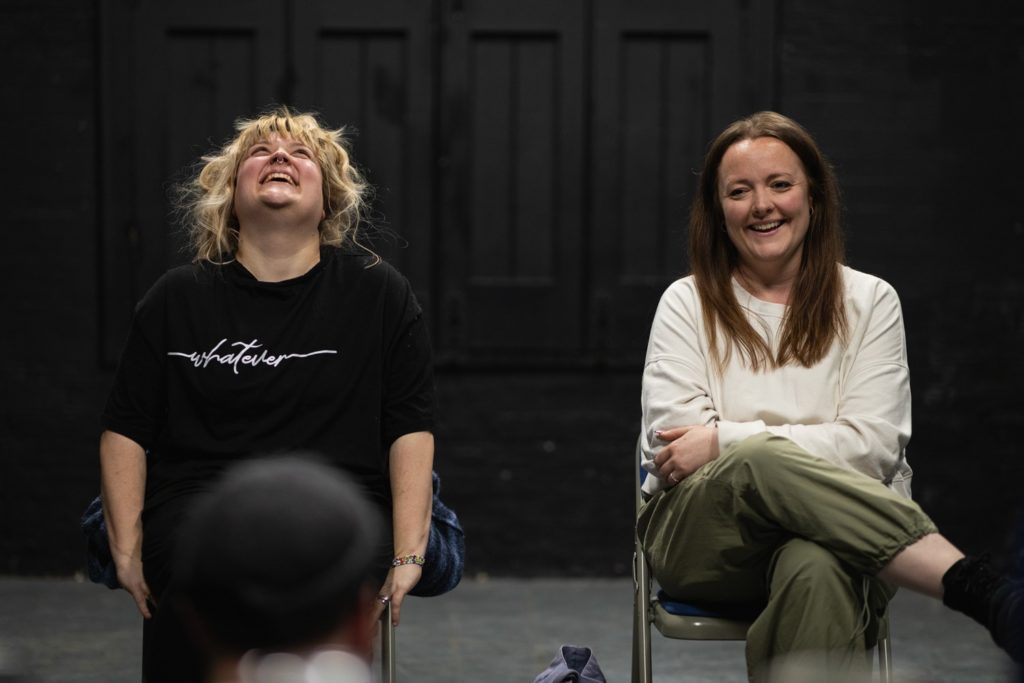
Evie Jones, left, and Christie Peto will make their Next Door But One debut in Hospital Doors at Theatre@41, Monkgate. Picture: James Drury
Matt’s play follows three estranged siblings who are thrown together for the first time in years when their dad falls ill. Peppered with the humour of family life, Hospital Doors offers a window into intersecting conversations about disability, sexuality, illness and care, all held within the same, chaotic family frame.
This intimate show, set in fleeting, transient places – in corridors, over garden walls, on phone calls – is stacked with questions and reflections of modern family dynamics, and the joy that can be found in the mundane efforts we all make to understand those we love.
Hospital Doors promises to be visually striking, with set and costume design by Stella Backman and Hull-based team Jessie Addinall and Amelia Hawkes contributing an ambitious lighting, video and creative caption design.
Producer Joshua Goodman says: “The team we have formed to create Hospital Doors are bringing so much skill and passion to the production that we are certain we can bring a memorable experience to our audiences, but the final performance isn’t where this all ends.”
The one-act play will be followed by a Playback Theatre performance on several dates, when the audience will be encouraged to stay on to share their own stories inspired by the play. These will then be improvised by a team of specialised performers and musicians.
“We know that a lot of our audiences appreciate time and opportunity to reflect on what they have just watched, and this will facilitate that,” says Joshua. “It will also help us to better understand our work and what resonates with people, which will only benefit the future of our work and ensure any developments remain informed by our community.”
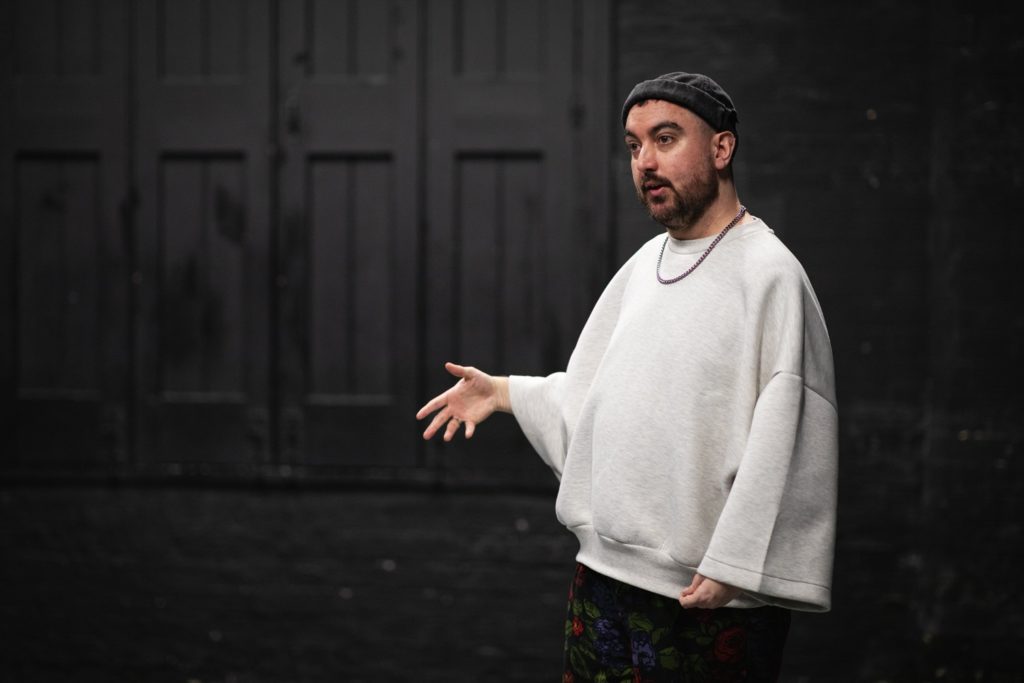
Hospital Doors writer-director and Next Door But One chief executive officer and artistic director Matt Harper-Hardcastle
Here, writer-director Matt Harper-Hardcastle discusses Hospital Doors with CharlesHutchPress.
What did the research and development (R&D) for this play involve over 18 months, Matt?
“We started by asking three of our community groups – disabled adults, LGBTQ+ young adults and unpaid carers – what a play that was representative of them would look like.
“From there we ran workshops on characterisation, creative writing and improvisation to shape the narrative, with every workshop focused on what they wanted Hospital Doors to say.”
How did you turn that research into a play?
“It was a purposefully gradual process, which started with an exchange of stories from across the different communities to find common ground, leading to an anthology of stories, poems, mood boards, Venn diagrams, pictures and transcriptions that I then formed into some initial scenes.
“These scenes went back to the groups who ‘red penned’ them or improvised around them to create more detail. This back-and-forth process went all the way through 2023 until we produced a rehearsed reading for all our community members to come to, provide feedback on and ‘sign off’, as it were.”
How have your own experiences influenced your writing of this play?
“They have really shaped the writing. As a gay, disabled man who shared caring responsibilities for my mum before she died, everything that was shared with me in the research & development I felt an affinity and empathy towards.
“It’s very rare that as a writer you get to bring so many facets of your identity into one script, so I’ve not only relished in the process, but also felt a great sense of responsibility.”
At the heart of NDB1’s mission is working with the community, with this production being the epitome of that work. Is that why you call it your “flagship show”?
“Absolutely. When we joined Arts Council England’s Investment Programme, one of our artistic ambitions was to look at how we could tighter braid the participation and performance strands of our work together; how we could work with our communities to create performances that then shared their experiences with wider audiences.
“It all connects – and Hospital Doors is a really thorough and public display of our commitment to this.”
Aside from filmmakers Mike Leigh and Ken Loach, it is hard to think of British writer-directors who would address these subjects so directly: disability, sexuality, illness & care and death. How come you discuss all four in one play?
“It can sometimes feel quite blinkered to make a show that is only about one subject or one identity, because in truth we don’t exist as a silo. A show about disability would naturally bring in conversations of relationships, as it would care, and so rather than ignoring that we looked at it intentionally.
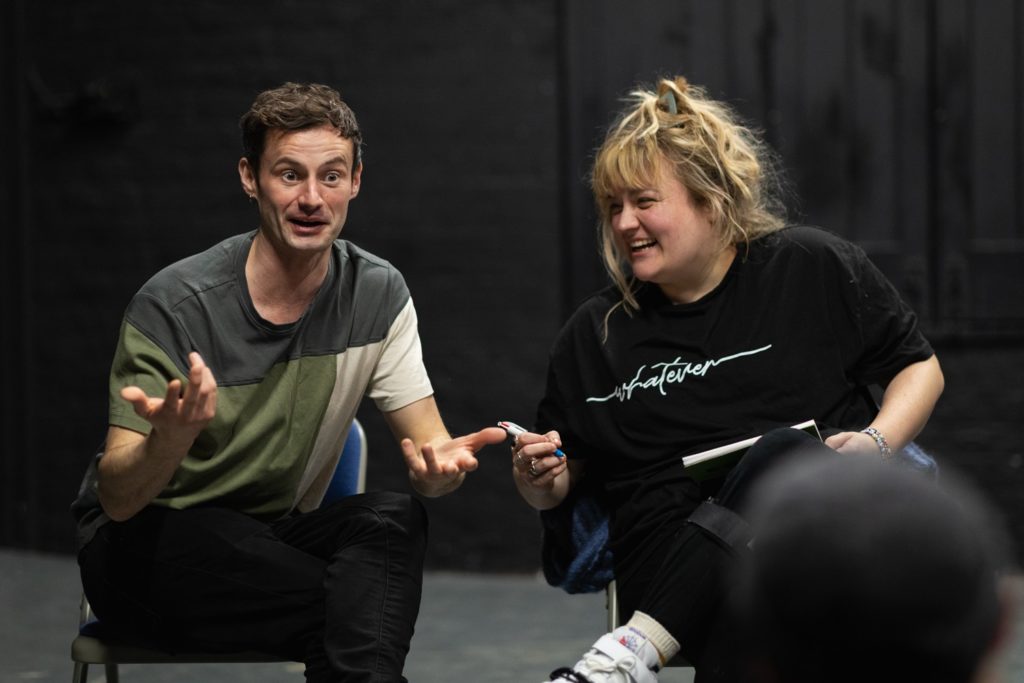
Ian Weichardt and Evie Jones in rehearsal for Next Door But One’s Hospital Doors. Picture: James Drury
“And in doing so, by placing these seemingly very different identities side by side, actually what it does is amplify them all and support a richer discourse in the very complex commonalities between them.
“Put it simply, our work exists to bring people together and that’s what we are hoping to do via this approach with Hospital Doors.”
Are all the cast – Christie Peto, Ian Weichardt and Evie Jones – new to Next Door But One?
“Yes – which is great, as we love working with new artists! We put a lot of effort into casting for this show, not only because we needed to form a trio of siblings, but also we really wanted to be as authentic as possible to our communities and therefore we sought actors who had a shared lived experience with our communities and therefore the characters.
“All three actors care very much about the play and what we are trying to achieve, but also have a wicked sense of humour which is making rehearsals very fun indeed. Ian is originally from York, Christie is from Leeds and Evie is a University of York alumnus.”
What strikes you as the best benefit of performing in the black box space of the John Cooper Studio at Theatre@41, Monkgate?
“We held our rehearsed reading there in 2023, so it feels like we are coming full circle, but also it’s the intimacy of the space, which we really wanted for Hospital Doors. We want the stories, the characters, the words and the emotions to be almost tangible to our audiences.”
What part will the set and video design, lighting, creative captions and sound design play in the show?
“We are condensing huge topics and hundreds of stories into a one act three-hander, so the design helps to bring in the epic scale of that mission! All of the design helps to paint the wider world of the play, show us the characters’ pasts, bring life to their memories and help us understand how much they are revealing or concealing.
“The creative captioning not only increases access to the performance, but also puts the important stuff front and centre – the words and stories handed to us by our community.”
What happens next to Hospital Doors? Maybe a full tour?
“This is definitely not the end of Hospital Doors. We could R&D it forever, but we needed to decide when to put down the pen and share it with an audience. That is now. What we learn from this, what we find resonates with or speaks to our audiences, will shape another future iteration that will then tour.”
What do Playback Theatre performances involve? When will they take place in the York premiere run?
“Playback Theatre will be our Act 2. Audiences who have watched Hospital Doors will be invited to stay and share their own stories, inspired by the play, and then watch them spontaneously performed by a team of actors.
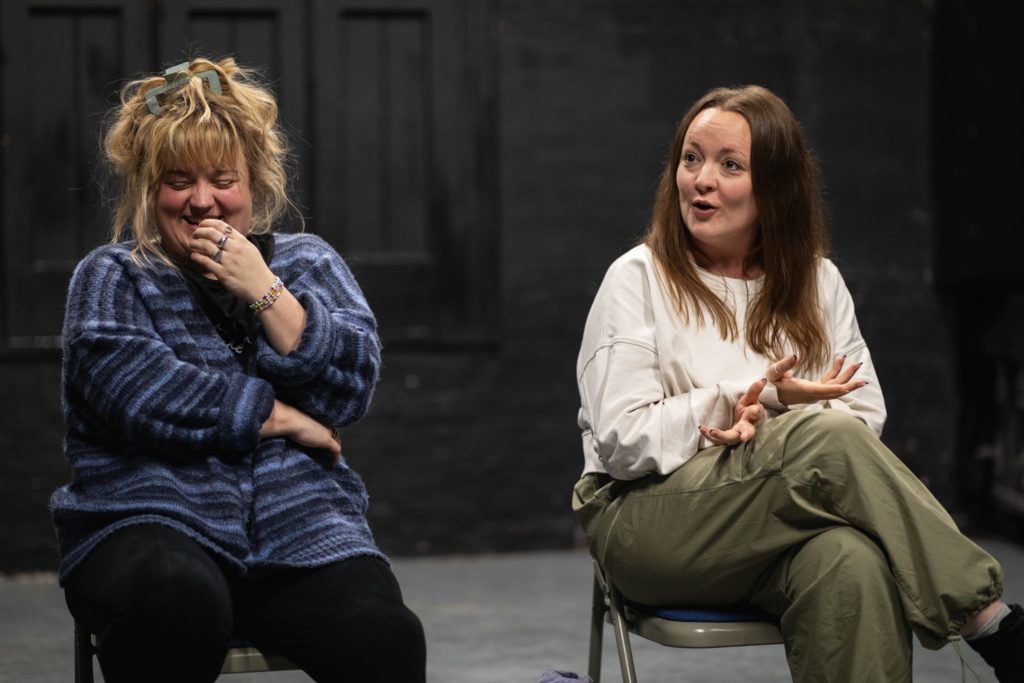
“Our actors care very much about the play and what we are trying to achieve, but also have a wicked sense of humour which is making rehearsals very fun indeed,” says writer-director Matt Harper-Hardcastle of Evie Jones, left, Christie Peto, right, and Ian Weichardt. Picture: James Drury
“This aims to give our audiences more time to reflect on what they have watched, connect with the play more and also understand what others have in common with it too.
“Also hearing the stores that Hospital Doors evokes in our audiences will help us understand the real moments of resonance and therefore how we should develop the play in the future. Playback Theatre will accompany all performances except the Thursday matinee and Saturday evening.”
How has NDB1 progressed in the company’s nine years? What fills you with the most pride?
“A lot has changed since we started; we’ve grown in size, in reach, in skill, in profile, in impact, but what has stayed the same is our values of what we do and why we do it. Even in the toughest of times these haven’t faltered and have always been our driving force. So I’m really proud of that.
“There are too many moments to think of that I’m most proud of, but I always have an anecdote from a recent project in my back pocket that I like to share that I think epitomises our work.
“The one I’m currently sharing a lot is from a carer who attended our Arts and Loss workshops. She recently lost her partner and was heavily in the throes of grief. At her first workshop, she cried a lot but wanted to stay, safe in the space we had created.
“Slowly she started to share her story. She then started using her experience to offer advice to others. She enjoyed being creative with new friends. At the end of the project, she gave me a hug and whispered ‘this is the happiest I’ve been all year’.
“It’s those moments – and there are many more like it – which are priceless, get me up in the morning and make me immensely proud of what NDB1 does.”
Next Door But One presents Hospital Doors at Theatre@41, Monkgate, York, March 12 to 15. Performances:7.30pm, except March 13, 7pm; 2pm matinees, March 13 and 15. Box office: tickets.41monkgate.co.uk.
Hospital Doors cast and creative team:
Actors: Christie Peto, Ian Weichardt, Evie Jones
Writer and director: Matthew Harper-Hardcastle
Designer: Stella Backman
Video, lighting and creative captions designers: Amelia Hawkes and Jessie Addinall
Sound designer and composer: Lara Jones
Company and stage manager: Jane Williamson
Next Door But One: the back story
OVER the past nine years, York community arts collective Next Door But One has been creating touring productions inspired by the lived experience of the communities from across their arts participation programme.
This has included Operation Hummingbird’s exploration of themes of bereavement and care; The Firework-Maker’s Daughter, created in partnership with neurodivergent young people and their families, and their most recent tour, She Was Walking Home, shaped from the real-life testimonies of 33 women living, working and studying in York.
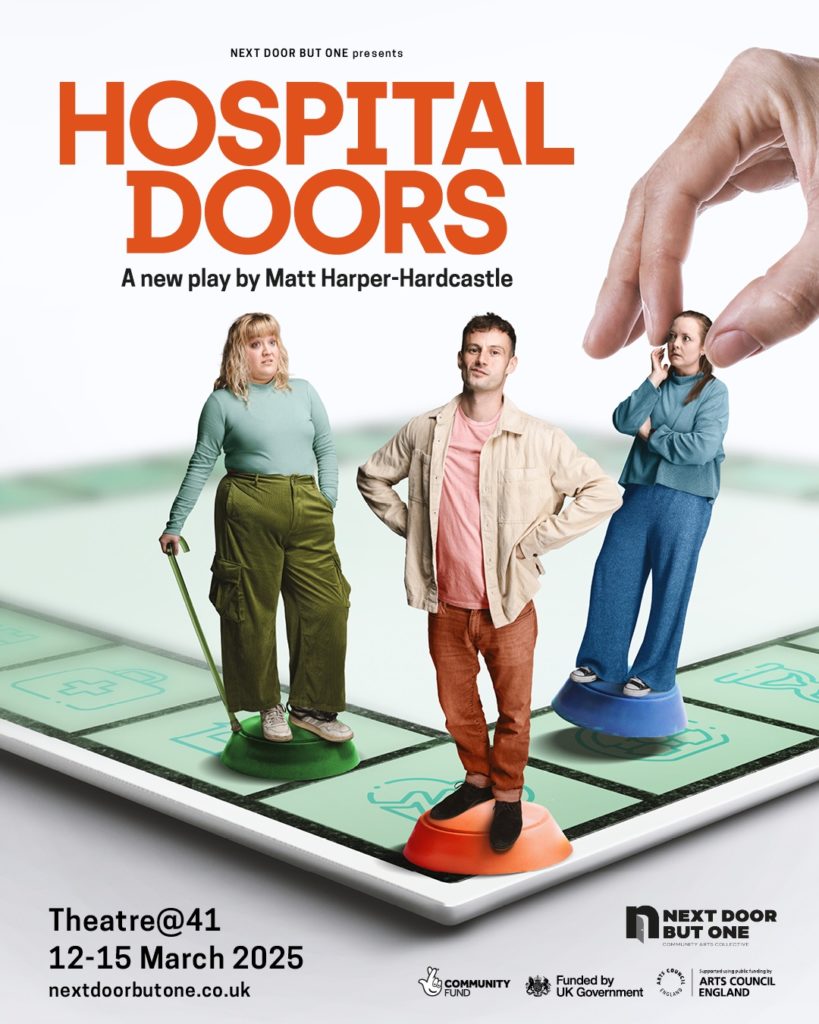
Next Door But One’s poster for Hospital Doors, next week’s production at Theatre@41, Monkgate, York

